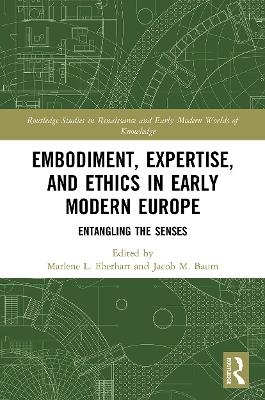
Embodiment, Expertise, and Ethics in Early Modern Europe
Routledge (Verlag)
978-0-367-53285-7 (ISBN)
Embodiment, Expertise, and Ethics in Early Modern Europe highlights the agency and intentionality of individuals and groups in the making of sensory knowledge from approximately 1500 to 1700. Focused case studies show how artisans, poets, writers, and theologians responded creatively to their environments, filtering the cultural resources at their disposal through the lenses of their own more immediate experiences and concerns. The result was not a single, unified sensory culture, but rather an entangling of micro-cultural dynamics playing out across an archipelago of contexts that dotted the early modern European world—one that saw profound transitions in ways people used sensory knowledge to claim ethical, intellectual, and practical authority.
Marlene L. Eberhart is Professor of Music at Vanier College, where she teaches music history and aural skills. She is the author of several articles on aural-visual-tactile intersections in art, literature, and public space, and is co-editor, with Paul Yachnin, of Forms of Association: Making Publics in Early Modern Europe (2015). Jacob M. Baum is Associate Professor of History at Texas Tech University, where he researches and teaches later medieval and early modern European history. His first monograph, Reformation of the Senses, was published in 2019. His current research focuses on the history of deafness and disability in early modern Germany.
Introduction: Entangled Senses—Putting Knowledge into Practice in Early Modern Europe 1. A Web of Sensation and the Performance of Memory: Dosso’s Lamenting Apollo 2. The Poet and the Ear: Aural Figurations in Sixteenth-Century French Poetry 3. The Artist David Joris (1501-56): The Prophet of the Renewed Senses 4. Abraham Scultetus and the God of Paste: Ritual Conflict and Sensuous Calvinism in the Second German Reformation 5. Shylock’s Senses: Entangled Phenomenologies of Difference on Early English Stages 6. Written on the Body: Selves, Communities, and the Sense of Pain in Early Modern England, 1600–1700 7. Blinding Lights and Sensory Others in Margaret Cavendish’s Blazing World 8. "Rather back to Ceylon than to Swabia": Global Sensory Experiences of Swabian Artisans in the Service of the Dutch East India Company (VOC) Afterword: A Roundtable Discussion—Volume Contributors explore several key issues, established and emerging, in sensory history
| Erscheinungsdatum | 12.05.2022 |
|---|---|
| Reihe/Serie | Routledge Studies in Renaissance and Early Modern Worlds of Knowledge |
| Zusatzinfo | 7 Halftones, black and white; 7 Illustrations, black and white |
| Verlagsort | London |
| Sprache | englisch |
| Maße | 156 x 234 mm |
| Gewicht | 510 g |
| Themenwelt | Geschichte ► Allgemeine Geschichte ► Neuzeit (bis 1918) |
| Geschichte ► Teilgebiete der Geschichte ► Kulturgeschichte | |
| Geisteswissenschaften ► Sprach- / Literaturwissenschaft ► Anglistik / Amerikanistik | |
| Geisteswissenschaften ► Sprach- / Literaturwissenschaft ► Literaturwissenschaft | |
| ISBN-10 | 0-367-53285-9 / 0367532859 |
| ISBN-13 | 978-0-367-53285-7 / 9780367532857 |
| Zustand | Neuware |
| Haben Sie eine Frage zum Produkt? |
aus dem Bereich


